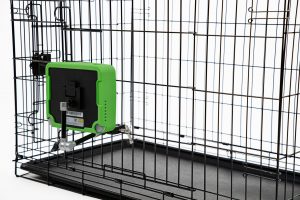Timely detection and quick recovery of sick cows is key for animal health, animal welfare and reduction of antibiotics. When using Ida, the intelligent dairy assistant, the recovery time of cows can be reduced by more than half. This was shown in a scientific field study. It is all about detecting the early signs of sickness.
Ida, developed by agtech company Connecterra, uses a sensor, cloud computing, integration of data sources and Artificial Intelligence (AI technology) for early detection of cow diseases such as ketosis, mastitis or digestive problems. Preventing that cows become clinically ill will reduce the number of days the cows need to be treated with veterinary medicine, such as antibiotics. Ida is a second pair of eyes on the farm, spotting early signs of anomalies in cow behavior, which are often the first signs of sickness.
To test the value of Ida as a true digital assistant and detector of sick cows on farms, Connecterra has been running a scientific field trial since January 2018 on two commercial dairy farms (Belgium and the Netherlands), each having a herd size of 100 milking cows. In the trial, randomly half of the cows received an Ida sensor. The field trial was done within the context of the Horizon2020 Internet for Food and Farm project and supported by Wageningen UR in the Netherlands. “It is the first time that we do such a field trial to test the use of sensor technology in relation to (antibiotic) treatment days. With the data over 2019 we now have information on treatment days per cow over a longer period of time (25 months). The results are impressive and confirm what we have seen in the first year (2018) of the trial”, explains Niels Rutten, researcher at Connecterra and coordinator of the trial.
“The 2019 results are impressive and confirm what we have seen in the first year (2018) of the trial”, explains Niels Rutten, researcher at Connecterra and coordinator of the trial.
Catching costly mastitis cases earlier
“These are great results and it shows that farmers who use technology such as Ida, to intervene much sooner. When Ida notices a reduction in rumination time for example, a farmer can act on it. A farmer may not always spot that a cow is eating less or lying more, but these behavioral changes are often the onset of disease. Having Ida means the farmer can check on the cow and prevent the disease from getting worse or clinical, hence leading to an overall drop in treatment days per cow. We see good results in the early detection of E. coli mastitis for example”, explains Niels Rutten.
Kees Lokhorst, senior researcher smart farming at Wageningen UR in the Netherlands adds: “The nice thing of this experiment is that it shows in practice that the Ida system is able to learn over time and is improving itself. The Internet of Things connected sensors and the central used Artificial Intelligence technology to improve warnings, really supported the individual farmers in detection and treatment”.
Andy van Rossem is dairy farmer in Belgium and participated in the field trial. He clearly sees the benefits of the Ida health insights. “Knowing the early signs of sickness is one of the biggest wins of using this technology. Mastitis is one of the diseases that Ida detected at a very early stage. I get notified in the app when there is a little drop in ruminating and eating behavior of my cows. I can then check on them and start (preventive) treatment sooner. For a costly disease such as mastitis it makes all the difference to be 1-2 days earlier with the start of treatment”, Van Rossem explains.
In the management of complex dairy farms, welfare of the cows and production costs play an important role. Keeping cows healthy can save a farmer a lot per year and reduce losses. This is especially the case for costly diseases such as mastitis, lameness or pneumonia. Wageningen University in the Netherlands calculated that mastitis is costing a farmer € 240 (221 US dollars) per lactating cow per year. In addition, this disease can result in a loss of 336 kilogram of milk. Canadian research showed that lame cows produce around 1.7 kilogram milk less per day. Keeping cows healthy helps in maintaining a resilient farm. Healthy cows reduce veterinary costs or losses when a cow dies or has to be replaced. Let Ida help you prevent unnecessary costs! Ida can reduce days of treatment and hence total antibiotic use.
The field trial, part of IoF, will run until the end of 2020. Together with Wageningen UR, Connecterra presented the first part of this study at the ECPLF in 2019, one of the most prestigious scientific conferences in the field of precision livestock farming.
Lire la suite: ida.io






